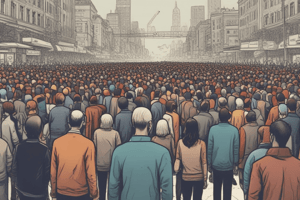Podcast
Questions and Answers
What is the primary focus of mass behavior in social psychology?
What is the primary focus of mass behavior in social psychology?
- Shared beliefs and values of individuals (correct)
- Interactions among individuals in a group
- Psychological state of individuals in a crowd
- Impacts of crowd mentality on individual behavior
Which factor is NOT mentioned as influencing group dynamics?
Which factor is NOT mentioned as influencing group dynamics?
- Financial status (correct)
- Goal consensus
- Intergroup relations
- Cohesion
What characteristic is associated with crowd mentality?
What characteristic is associated with crowd mentality?
- Indecisiveness
- Isolation
- Anxiety reduction (correct)
- Conservative decision-making
In what situations is mass behavior often observed?
In what situations is mass behavior often observed?
What does group dynamics refer to?
What does group dynamics refer to?
How does high cohesiveness within a group influence behavior?
How does high cohesiveness within a group influence behavior?
What is the primary factor that contributes to mass behavior, according to the text?
What is the primary factor that contributes to mass behavior, according to the text?
What is the difference between social influence and conformity?
What is the difference between social influence and conformity?
What can influence the degree of conformity within a group?
What can influence the degree of conformity within a group?
What is the difference between deviance and opposition in the context of mass behavior?
What is the difference between deviance and opposition in the context of mass behavior?
What is the role of social control in mass behavior?
What is the role of social control in mass behavior?
Which of the following is NOT mentioned as an application of the study of mass behavior in social psychology?
Which of the following is NOT mentioned as an application of the study of mass behavior in social psychology?
Study Notes
Mass Behaviour in Social Psychology
Mass behavior is a phenomenon where individuals act together in large groups based on shared beliefs and values. This type of behavior is often observed during events such as protests, riots, and revolutions, where people come together to express their collective views and demands. In the field of social psychology, mass behavior has been studied extensively to understand how and why it occurs, its consequences, and the potential factors influencing group dynamics.
Group Dynamics
Group dynamics refer to the interactions and relationships among individuals within a group. These dynamics can influence individual behavior and decision-making, leading to mass behavior. Factors like cohesion (the degree of belongingness), goal consensus (shared objectives), and intergroup relations (the attitude towards other groups) play significant roles in shaping group dynamics. For instance, a high level of cohesiveness within a group may increase the likelihood of conformity and obedience, which could lead to mass behavior.
Crowd Mentality
Crowd mentality refers to the psychological state experienced by individuals when they become part of a crowd. It is characterized by feelings of excitement, exhilaration, invulnerability, and reduced anxiety, making people more willing to take risks and engage in behaviors that might be avoided otherwise. This heightened emotional state can contribute to mass behavior, as individuals may feel emboldened to act collectively without considering potential consequences.
Social Influence and Conformity
Social influence and conformity play crucial roles in mass behavior. Social influence refers to the process where individuals adopt the attitudes, beliefs, and behaviors of others in their social environment. Conformity, on the other hand, is the act of adjusting one's beliefs and behaviors to match those of the majority within a group. Social psychologists have identified several factors that can influence the degree of conformity, such as group size, social norms, and individual characteristics.
Deviance and Opposition
Although mass behavior often involves conformity, there can also be deviance and opposition within groups. Deviance is the act of behaving in a way that violates social norms or expectations, while opposition refers to actively resisting or challenging the norms or demands of the majority. The presence of deviance and opposition can influence the dynamics of mass behavior, leading to conflicts, splits, or even the dissolution of the group.
Mass Behavior and Social Control
Social control refers to the processes and mechanisms through which society manages and regulates the behavior of its members. In the context of mass behavior, social control can take various forms, such as legal sanctions, social norms, or self-regulation. Understanding the role of social control in mass behavior can help explain why some groups engage in extreme behaviors while others do not.
Applications in Social Psychology
The study of mass behavior has numerous applications within social psychology. For example, understanding group dynamics and crowd mentality can aid in the design of effective communication strategies for public health campaigns or political initiatives. Additionally, insights into conformity and deviance can inform organizational management, conflict resolution, and intergroup relations. Furthermore, examining the role of social influence and conformity can help us understand how collective beliefs and values shape individual attitudes and behaviors.
In conclusion, mass behavior is a complex phenomenon influenced by various factors, including group dynamics, crowd mentality, social influence, conformity, deviance, and opposition. By studying these aspects, social psychologists can develop a deeper understanding of collective behaviors and their implications for individuals and society as a whole.
Studying That Suits You
Use AI to generate personalized quizzes and flashcards to suit your learning preferences.
Description
Explore the phenomenon of mass behavior in social psychology, including group dynamics, crowd mentality, social influence, and applications in understanding collective behaviors. Learn about the factors influencing mass behavior and its implications for individuals and society.




